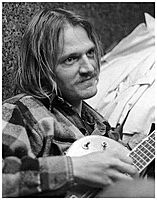Danny Whitten facts for kids
Quick facts for kids
Danny Whitten
|
|
|---|---|
 |
|
| Background information | |
| Birth name | Danny Ray Whitten |
| Born | May 8, 1943 Columbus, Georgia, U.S. |
| Died | November 18, 1972 (aged 29) Los Angeles, California, U.S. |
| Genres | Hard rock, country rock, blues-rock |
| Occupation(s) | Musician, songwriter |
| Instruments | Guitar, vocals |
| Years active | 1962–1972 |
| Labels | Liberty, Valiant, Loma, a division of Autumn, White Whale, Reprise |
| Associated acts | Danny & The Memories, The Psyrcle, Bonnett & Mountjoy, The Rockets, Crazy Horse, Neil Young |
Danny Ray Whitten (born May 8, 1943 – died November 18, 1972) was an American guitarist and songwriter. He is most famous for playing with Neil Young's band, Crazy Horse. He also wrote the popular song "I Don't Want to Talk About It", which became a hit for Rod Stewart.
Contents
Danny Whitten's Life and Music
Early Years and Family
Danny Whitten was born on May 8, 1943, in Columbus, Georgia. When he was young, his parents separated. Danny and his sister, Brenda, lived with their mother. She worked hard as a waitress. When Danny was nine, his mother remarried, and they moved to Canton, Ohio.
Starting in Music
Danny Whitten loved music from a young age. He joined a doo-wop group called Danny and the Memories. Other members included Billy Talbot and Ralph Molina. They recorded a song called "Can't Help Loving That Girl of Mine".
Later, some members moved to San Francisco, California. There, they formed a new band called The Psyrcle. This group played folk and psychedelic rock music. Whitten played guitar, Molina played drums, and Talbot played bass and piano.
By 1967, the band grew and added more musicians. They became known as The Rockets. They signed with a record label called White Whale Records. In 1968, they released their first album, The Rockets. However, the album did not sell very well.
Joining Neil Young and Crazy Horse
Neil Young, a famous songwriter, had just left his band Buffalo Springfield. He started playing music with Whitten, Molina, and Talbot from The Rockets. Young wanted to record with them. The three musicians agreed, but they also wanted to keep playing with The Rockets.
Young first called them "War Babies". Soon, they became known as Crazy Horse. Their recording sessions led to Neil Young's second album, Everybody Knows This Is Nowhere. This album was credited to Neil Young with Crazy Horse.
On the album, Danny Whitten played second guitar and sang. He sang the opening song "Cinnamon Girl" with Neil Young. Whitten and Young also shared lead guitar on other songs like "Down by the River" and "Cowgirl in the Sand". These songs later influenced a music style called grunge in the 1990s. Neil Young still plays these songs today.
Later Years and Legacy
Danny Whitten continued to work with Neil Young and Crazy Horse. He was a very talented guitarist and songwriter. He wrote many songs, including "I Don't Want to Talk About It". This song became very popular years later when Rod Stewart and the band Everything but the Girl recorded it.
Sadly, Danny Whitten passed away on November 18, 1972. Neil Young later shared that he felt sad about Whitten's death for a long time. It took him many years to stop blaming himself. Danny Whitten's music and guitar playing continue to be remembered by fans.
Songs Written by Danny Whitten
- "Baby, Don't Do That" (Whitten, Billy Talbot)
- "Dirty, Dirty" (Whitten)
- "(Come On Baby Let's Go) Downtown" (Whitten, Neil Young)
- "Hole in My Pocket" (Whitten)
- "I Don't Want to Talk About It" (Whitten)
- "Let Me Go" (Whitten)
- "Look At All The Things" (Whitten)
- "Love Can Be So Bad" (Whitten, Lolly Vegas)
Images for kids
See also


